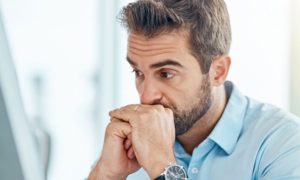T hese past few weeks have seen the stock market crash, the stores empty of staple goods, bars and restaurants close, schools and workplaces go online. It’s unprecedented in our lifetime and many of us are unsure of how to respond or what to do that will make our families safer. As we make choices, we must examine which decisions help resolve issues, as opposed to those that only reduce anxiety.
hese past few weeks have seen the stock market crash, the stores empty of staple goods, bars and restaurants close, schools and workplaces go online. It’s unprecedented in our lifetime and many of us are unsure of how to respond or what to do that will make our families safer. As we make choices, we must examine which decisions help resolve issues, as opposed to those that only reduce anxiety.
But isn’t reducing anxiety and worry good?
Not necessarily: the better question is “Does this action make me, or those around me, safer?” We often act to reduce negative emotions or physical sensations we don’t like, but that doesn’t always help address the problem. If I’m trying to lose weight, I will feel hungry as I intake less calories. I can feel ‘good’ by eating more food and thereby reducing my hunger, but that will defeat my long-term goal of losing weight. So while feeling hungry doesn’t feel good, it’s an indication that I’m burning fat off my body which is good for my long term goal of weight loss. The uncomfortable sensation of hunger is a good indication of reaching my goal – even though it doesn’t feel good! In the same way, sometimes it’s acceptable to have some level of stress, and potentially anxiety, to address an issue, like studying for an exam. What isn’t useful is worry. Worrying doesn’t resolve any issue, it just makes me feel unprepared and uncomfortable.
I don’t know how long this will last, so shouldn’t I stockpile just in case?
Having enough is a good idea: having too much can waste resources (my money, and the ability of others to get it if they need it). A few days ago there was a gentleman in my local store trying to return four gallons of milk because he couldn’t finish all of it. Thinking through problems rationally is important. We have information from other nations that indicate that our nation’s infrastructure is sound, so it’s unlikely that water will stop running from taps or that goods and services will cease. So while it’s unnecessary, it makes me feel better if I have a few extra rolls of toilet paper, or bottles of water (especially since everyone else is getting them, which makes it feel like it’s a good idea). But what should I stockpile? And how much? If I were to apply that mentality to social distancing, than rather than six feet apart, would 12 be better? Is farther apart really better? Rather than giving in to our fears, making wise decisions of how much we need is better for my pocketbook and for my community as well.
Ok, so what should I do?
We’ll answer this question with several other questions:
-
What problems can I address? What problems should I address?
- I can’t stop COVID-19 individually. I can potentially slow its rate of growth in my community and decrease the risk to my family through socially distancing and washing my hands with soap.
-
What is the limit of my ability to affect change?
- I am in control of my movement in my community, of what I buy, and of what I say and do. What I say and do affects my own level of anxiety and those around me.
-
Will this behavior help address the problem, or just reduce my anxiety?
- I have to accept that there will be stress in this new normal. I need to examine my behaviors to see if they actually help me in the long run, or just make me feel better in the moment.
We have to acknowledge that we are in a situation causes stress and anxiety. How we respond to that stress and anxiety is very important, and that is within our control. We also have to accept there are many issues that are not within our control, and have to acknowledge that we are not in control, and that’s ok.
